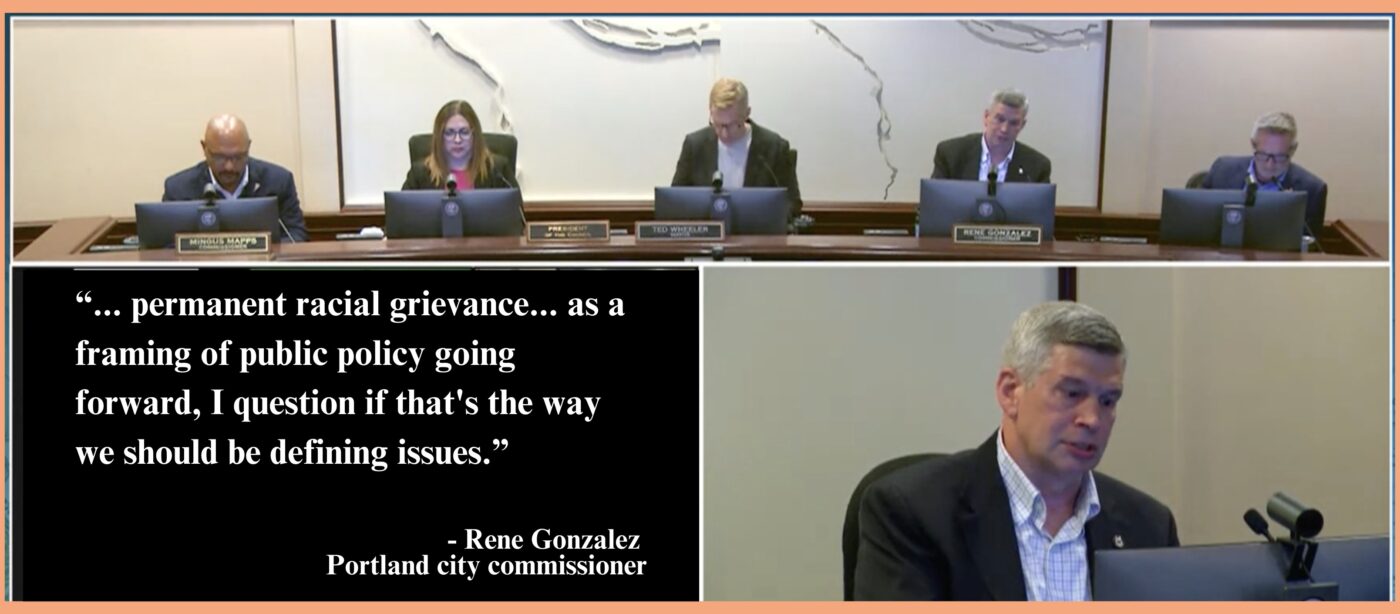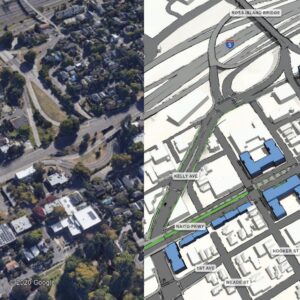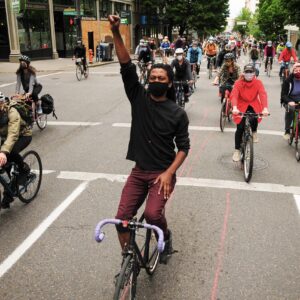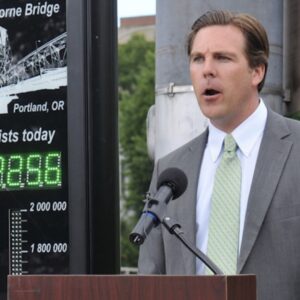Portland City Council passed a landmark climate change investment on Wednesday when they voted unanimously in support of the $750 million, Portland Clean Energy Fund (PCEF) five-year spending plan.
As I shared yesterday, at least $80 million of that fund will support bicycling and other transportation programs and projects that encourage people to drive less. $25 million of it will go directly to the Portland Bureau of Transportation to boost an existing program that provides free bus, BikeTown, scooter, and taxi rides. Strangely, PBOT Commissioner Mingus Mapps — who just 24 hours ago laid out the most bleak transportation budget in the history of Portland — was the only person on council to not make a statement to mark the historic occasion.
But while Mapps’ silence was notable, it was the statement from Commissioner Rene Gonzalez that really stood out.
Before voting yes on the measure, Gonzalez shared several “deep concerns” with the plan.
(Listen to audio of Gonzalez’s remarks below.)
Gonzalez expressed shade at the carefully-vetted plan, a plan that went through months of careful outreach to thousands of Portlanders and was rigorously vetted by a nine-member committee made up of climate experts, business owners, community leaders, and academics. Without any evidence or explanation to back it up, Gonzalez said he had “concerns” and “real questions” about whether the investment would “truly push for decarbonization.”
Dismissive, condescending comments like this erode public trust in city government and depress civic engagement when we need it most. They also typify the, I-know-better-than-you-because-I’m-up-here-and-you’re-down-there mentality from some elected officials that Portlanders are eager to jettison when they vote for a new slate of councilors next year.
Then Gonzalez said, “Deeply embedded in this ordinance is permanent racial grievance… and as a framing of public policy going forward, I question if that’s the way we should be defining issues.”
That was a very surprising thing for a councilor to say, given that this PCEF plan tracks very closely to many existing City of Portland policies and a deep body of public health research. He also refuted something that, while it’s clearly uncomfortable for him personally, also happens to be a fact. Racism has underpinned much of the planning and infrastructure investments throughout Portland’s history.
Gonzalez has only been on council for 10 months, so perhaps he’s unaware that the Portland Bureau of Planning & Sustainability (the bureau that oversees PCEF) has documented this racism and that PBOT’s current strategic plan includes “Will it address structural racism?” as one of the two questions it asks before making decisions.
The 2019 BPS publication, Historical Context of Racist Planning: A history of how planning segregated Portland is just the tip of the iceberg. From the “urban renewal” policies and highways that decimated lower Albina and south Portland, to the flooding of Vanport, to the heat islands that exist today in east Portland — environmental racism isn’t a philosophy or just a useful “framing.” It is fact.
And it’s not just a Portland thing. The Justice40 Initiative, passed via executive order by President Joe Biden in 2021, made it an official policy of the United States to direct climate, transportation, and clean energy investments to marginalized and disadvantaged communities. Interestingly, the White House did not make race a qualifying factor due to a concern over legal challenges (although Biden called out “communities — brown, Black, Native American, poor whites” in speeches about it). As a result of race not being considered, studies have shown that the initiative will be much less effective in narrowing the racial gap that exists in places hardest hit by climate change impacts.
Gonzalez also said it’s “problematic” to him that the communities that will benefit from PCEF investment plan have been chosen using a “strictly racial framing.” That is untrue. The PCEF Climate Investment Plan (CIP) never says that. On page of 12 of the plan, it states: “PCEF recognizes the crucial role of communities of color and low-income people as frontline leaders in effecting change.”
For someone concerned about incorrect framing, Gonzalez appears to be the one guilty of that here.
— PCEF is funded through a 1% surcharge on the Portland sales of large retailers with $1 billion in national revenue and $500,000 in local revenue. Learn more about the PCEF Climate Investment Plan here.








Thanks for reading.
BikePortland has served this community with independent community journalism since 2005. We rely on subscriptions from readers like you to survive. Your financial support is vital in keeping this valuable resource alive and well.
Please subscribe today to strengthen and expand our work.
Gonzalez and Mapps’ political strategy has consistently been the “king of the idiots” approach. They promote oversimplified, fear-based views of the world that appeal to a base with strong biases and lack of curiosity or self-inquiry.
This is reflected in the previous council meeting that suggested transportation funding is as simple as “drivers” picking up the tab for all other forms of transportation. It was evident in Gonzalez’s campaign, where he partnered with racists, vowed to criminalize poverty and ignorantly attacked important public health policy. Mapps is joining in, clearly expecting the PBA contingent to pony up for truck loads of inflammatory and often factually incorrect mailers to Portland households.
One of the great things about Portland compared to other cities was that previous politicians tended to approach the electorate as being thoughtful and well-informed. This seems to have shifted over the past several cycles as large influxes of donations and misinformation have proven to move the needle on elections. Of course previous elected officials weren’t perfect, but they were not blatantly trying to become the king or queen of the idiots.
I’m no apologist for Mapps or Gonzalez but the more people attack their association with groups like PBA or support pro business causes the more it emboldens their political capital. The vast majority of voting Portlanders know the city is on the ropes & will vote accordingly for candidates who are pro business. Why? Because they see the effects with their own eyes. No tourists filling hotels downtown. No conventions at the Oregon Convention Center. People concerned for their safety walking or biking around Portland at night or going to an event at the Moda Center. Who is going to make up for the lost tax revenue if tourists and conventions don’t come back to Portland? Who is going to pay the business taxes if businesses keep deciding to vacate downtown Portland? Who is going to pay for the tax increases needed to support basic services if the wealthy & middle class decide to relocate as many have over the past few years?
I believe that most BP readers know that the PBA is not broadly pro-business, but consists of a small group with specific self-serving interests. They have also funded “Portland is Burning!” propaganda for shortsighted political gains that have probably hurt themselves and other non-affiliated small businesses much more than Mapps and Gonzalez’s shady dealings will ever help them. The most pro-business, pro-brand-Portland, stance that people can take is supporting the creative place-building instincts of Portlanderes that boosted tourism, iconic small-businesses and the collective joy of living in Portland decades ago. And yes, that includes bike lanes and public spaces that are naturally appealing to humans.
Catering to old guys that throw tantrums about bike lanes because they don’t understand how the world is changing is not the way forward.
There’s a great article in the latest issue of Street Roots explaining some of the complexities behind why downtowns are dying. One of the biggest issues dates back to Reagan Era tax breaks that incentivized developers to build mostly commercial real estate. The result was something like 70-80% of US downtowns being dedicated to office space, a lack of investment in residential real estate and community spaces, and what little retail now exists being far too reliant on (in-person) office workers. In other words, Covid alone didn’t hollow out downtowns; it was simply the spark after several decades of the room filling with gas.
@Fuzzy Blue Line, You’re not wrong that the public will “vote accordingly for politicians who are pro business.” You’re also making SD’s point that Mapps and Gonzalez are catering to a public that is increasingly disinterested in appreciating or exploring the myriad complex reasons for Portland’s problems, including (but not limited to) how to bring people and businesses back to downtown. Gonzalez’s oversimplified sound bites are easier for the public to digest than the harsh and extremely complex reality that there are no simple or quick solutions here. Our city has been built inefficiently for decades now, and that will take decades of hard work, by both the citizenry and the government, to fix.
Unfortunately, all I see or hear from Gonzalez and Mapps is a desire to get elected, then wait around for business to save us. I agree that we need to bring revenue back, but the source of that revenue has to be more diversified to improve adaptability. We have to learn lessons from Covid, while also exploring what made our city so vulnerable to it in the first place.
I suggest that we all start acquainting ourselves with the upcoming city council candidates, and encourage our friends, family and neighbors to be wary of any who don’t appear to comprehend the systemic problems we face and who claim to have all the answers.
Is Street Roots an unbiased voice? They were given over $1 million dollars from PCEF for their new office. Astounding but true. No money for bike lane maintenance but $1 million to build a new office for a private organization. Wow.
Mm … Really.
Is he suggesting that the money would be better spent going to the PBA/more cops/more lanes? To say nothing of the people who are actually literally starving from not enough food.
“people who are actually literally starving from not enough food”
Who in Portland is actually literally starving? If you know someone, please connect them with the Food Bank and other resources.
1 in 10 Oregonians face food insecurity according to Oregon Food Bank, 1 out of 8 children here, too..
Perhaps, but not “literally starving.”
Food insecurity is real, especially in Oregon; no need for hyperbole.
Got it. Food Insecurity:
Yes.
It should be obvious to anyone paying attention recently that BikePortland is essentially a political mouthpiece for the “progresives” in Portland politics and little else. Can’t recall the last time I saw an article here that was actually about the cycling community and not just regurgitating talking points and weasel words from Street Trust et al. Give it a rest already.
I went back through the last twenty or so posts on the site and I’m having trouble finding one that’s not about cycling. The heck are you talking about?
Oh you mean the myriad articles about bike lanes and PBOT stuff? That seems pretty literally about the cycling community. You must not have looked at the front page.
Or maybe the cycling community is keenly aware of how issues like policy, urban design & planning, social justice, climate, poverty and more impact biking, both directly and indirectly. I’m guessing the vast majority of us here prefer that BikePortland keep doing what they’re doing.
I think “racial grievance” is over the top, but it’s not any more hyperbolic or disingenuous than anything more progressive commissioners have been dishing out for at least a decade. I don’t think it disqualifies the premise in either case.
He is right that the city has budgetary issues, and I don’t consider it short-termism to say that this splash of money addressing climate change by a city making up 0.01% of the world’s population maybe doesn’t have the same impact as plugging holes in core services. Even a carbon-negative Portland will have heat waves, and while we can spend this money to mitigate them, what was it all for if you end up dead on the street?
And while I’m sure that the police budget is a usual suspect for trimming fat, allow me to say that two wrongs don’t make a right. This city isn’t any better at farming out its spending than its own. Here’s hoping that a city manager will change that.
Gonzalez and Mapps do you seem to have similar strategies…. I was cautiously optimistic about Mapps, before this Broadway bike lane episode… thinking he might not be *as bad* as I thought. But no. Called that one.
Gonzalez is similar, but less intelligent. He’s more transparent & is “not going to let the perfect be the opposite of the good.” While the perfect might sometimes be the enemy of the good, I believe we can still do better than Gonzalez and Mapps.
Anything “climate” or “equity” related is green-stamped without any actual policy analysis.
The election build up by Maus. First he supported Hardesty despite her incompetence and now he is slamming Gonzalez despite his competence. Gonzalez seems to be the one Council Member who is pushing to get Portland back on track so we can afford active transportation maintenance and infrastructure improvements once again.
Bike Portland seems to have pivoted from a bike blog to a far left political action committee. Jonathan, have you had any donations from George Soros? Maybe you should disclose your donors for the sake of transparency.
Agreed. Jonathan who is funding you? Any big donors we should know about so we can be aware of your potential biases?
You all are really hilarious. Just FYI BikePortland cannot accept grants because this is a privately owned company. Because you asked:
BikePortland is an S Corp registered in Oregon. I am the president and CEO and majority owner. There is one co-owner who owns a share of the company. His name is Mike Perham and he’s a software guy who lives in Lake Oswego. He made some really cool software that has allowed him to invest in things he believes in. He has no demands of ROI and my lawyer called him “the perfect investor.” He just wants to see BikePortland thrive because he understands how important a free, independent press is to democracy.
Mike’s investment helped me hire a f/t reporter for a while and level-up our audio/visual game. It also stabilized my finances in a rough patch and I’m forever grateful to him!!
These days, my largest funder by far are people who read and appreciate this site. They pay $5, $10, $20, $50 a month or more to support a service they use, rely on, and value.
I make some revenue from advertisers, but not that much.
Overall, I don’t make money doing this (but I’m still trying!). I stay just about even and don’t have big savings or retirement or anything. My wife had to return to work after raising our kids because I’m too dedicated to this to quit and our family needed health insurance and a bit more financial breathing room. I think BikePortland still frustrates her because she knows how much it means to me, but she also wishes our family had a bit more financial security given all the years I’ve given to this thing and all the money I could make doing something else given my skills and experience and work ethic.
So yes, I do have biases. I’m biased toward making bike better and building a strong community and a great city. I’m biased toward doing what my community needs at any given time, because at the end of the day they are in charge of this site and whether or not I can continue to do it.
Any other questions?
“Jonathan, have you had any donations from George Soros?”
Give me a f’ing break. There’s far too much conspiratorial thinking around here (e.g. Williams taking bribes from the PBA! Someone has kompramat on Mapps! Gonzales is a secret Republican!) but this takes the cake.
Most of the time, things are exactly as they seem, boring as that is.
George Soros is not pulling the strings at Bike Portland.